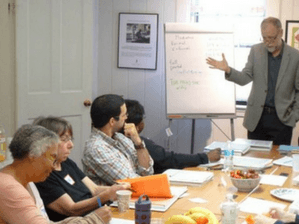Get Help With Your Conflict
MetroMediation helps people hear each other and find a peaceful solution.
These services are voluntary, confidential, and free. When disputes get stuck, a mediator can help. Call us (617) 241-0300 or email us, and we will identify and connect you with an experienced MetroMediation mediator suited to your needs. MetroMediation is a nonprofit organization. Our mediation services are voluntary, confidential, and free.
While each dispute is unique, the mediation process generally works like this: A member of our staff will contact everyone involved to coordinate an agreeable meeting time and accessible place, in person or virtually. Along with a selected mediator, all participants will come together to hear each other’s concerns. Sometimes, the mediator will meet with each side privately as well. The mediator facilitates these conversations, helping each party communicate and sort out their needs and interests. With support from the mediator, participants work on brainstorming solutions and make any decisions through mutual conversation and agreement. Talking it through and finding agreement often takes just one session. Sometimes additional sessions might be useful.
Contact Us to Request Mediation-
For consumers and businesses
The Massachusetts Office of the Attorney General has authorized MetroMediation to help resolve disputes about the rental or purchase of goods or services. If you are a consumer or business in a disagreement about consumer issues such as product satisfaction, delivery, installation, repairs, home improvements, landlord/tenant relations, auto sales or repairs, the lease of furniture or equipment, or related subjects, MetroMediation can help you negotiate a solution.
-
For tenants and landlords
With so much at stake, housing disputes can get both personal and perilous. MetroMediation can help tenants and landlords find solutions that feel respectful, concrete, and secure. We can help you negotiate payment plans or navigate disputes over damage or repairs while establishing a more positive relationship for going forward.
-
For neighbors, condo associations, or roommates
Living near or with each other can become complex and conflicted, especially if rent, dues, or damages are involved. Yet getting along is crucial to our peace, comfort, and happiness. Mediation can lead to more productive communication and more positive relationships, shifting a dispute onto more neutral ground. If you, your neighbors, or your local association are struggling to resolve disagreements over fees, decision-making, noise, or other issues that get in the way of your living situation, MetroMediation may be able to help.
-
For children and youth
At home, at school, or in juvenile court, mediation can help resolve conflicts, deter violence, and improve communication for young people and the adults who care about them. The process fosters dignity, respect, and responsibility and can change behavior patterns that could otherwise lead to school discipline, court involvement or home removal. In our confidential and safe setting, all participants can face one another honestly and respectfully, in search of better choices and more positive dynamics. Together, everyone can talk through their challenges and decide on concrete steps to make life more manageable.
Families are welcome to contact MetroMediation directly. Schools, juvenile courts, and social service organizations may also refer families to help find a solution other than court or child welfare systems.
MetroMediation is proud to partner with many Greater Boston youth-serving agencies, including the Massachusetts juvenile courts, Brookline Public Schools, Boston Public Schools, Newton Public Schools, the New England Network (formerly the New England Consortium for Families, Children, and Youth), the Massachusetts Behavioral Health Care Consortium, and New Pathways Youth Shelter.
-
For families dealing with disputes among siblings, parents and adult children, marital conflict, or elder care
Sometimes that hardest discussions are with the people with whom we have the most longstanding or complex relationships. MetroMediation works with couples and families seeking a way to manage conflicts while retaining positive relationships, including in situations regarding the living situations of and care for aging parents and other relatives.
-
Court mediation
Each year, the Massachusetts courts and the Massachusetts Office of the Attorney General refer hundreds of cases to MetroMediation. We are an approved provider of mediation services under the Massachusetts Supreme Judicial Court’s Uniform Rules on Dispute Resolution. Our mediators work with plaintiffs, defendants, youth and families to settle disputes in a way that benefits all sides. MetroMediation is approved to serve and regularly works with these courts:
- Boston Municipal Courts in all divisions and serving all neighborhoods of the City of Boston. We are regularly active in the Brighton, Dorchester, West Roxbury, and Central (Downtown) Divisions.
- Massachusetts District Courts serving the communities of Avon, Brookline, Canton, Chelsea, Newton, Revere, Sharon, and Stoughton
- Massachusetts Juvenile Courts in Middlesex, Norfolk, and Suffolk Counties
- Massachusetts Superior Courts in Middlesex, Norfolk, and Suffolk Counties
- Massachusetts Probate and Family Courts in Middlesex, Norfolk, and Suffolk Counties
-
For additional kinds of disputes
In almost any situation where people interact, they can have conflicts. Whenever people are willing to sit together with a mediator to speak and listen to one another, MetroMediation can help. We facilitate solutions to conflicts throughout personal, professional, and community life, including workplace and employment conflicts and disagreements between health care providers and clients. Please contact MetroMediation to learn more. If your situation falls outside our expertise, we will strive to refer you to someone who can help.
Confidentiality is the spirit and practice in mediation by MetroMediation, and is protected by statute (MGL Ch. 233, s. 23C) and, in court referred matters, by the SJC Uniform Rules on Dispute Resolution.





